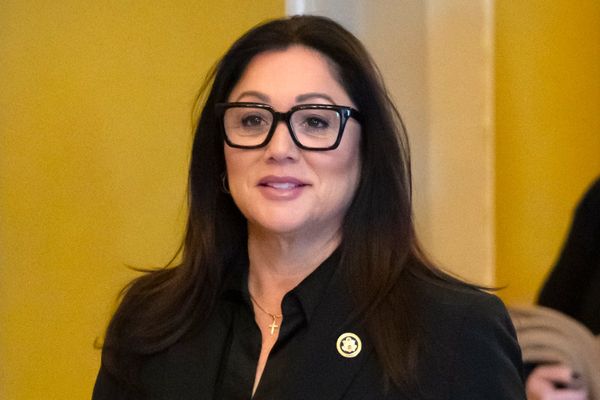
Meeting then-Israeli president Reuven Rivlin in Jerusalem in May 2017, Donald Trump stunned advisers by criticising the then-prime minister, Benjamin Netanyahu, for being unwilling to seek peace while Mahmoud Abbas, the Palestinian leader, was “desperate” for a deal.
The comment “knocked everyone off their chairs”, David Friedman, Trump’s ambassador to Israel, writes in a new book.
“Although the meeting was private and off the record, we all envisioned a headline tomorrow that Trump had praised Abbas and criticised Netanyahu – the worst possible dynamic for the president’s popularity or for the prospects of the peace process.
“Fortunately, and incredibly, the event wasn’t leaked.”
Friedman now describes the incident, and how he says he changed Trump’s mind, in Sledgehammer: How Breaking with the Past Brought Peace to the Middle East, a memoir which will be published next week by Broadside Books, a conservative imprint of HarperCollins. The Guardian obtained a copy.
Trump’s bankruptcy lawyer was a hugely controversial choice for ambassador. As well as being a hardline pro-settler rightwinger, during the 2016 campaign he called Barack Obama an antisemite and J Street, a liberal US Jewish group, “worse than kapos”, Jewish prisoners who worked as guards in Nazi concentration camps.
He was confirmed as ambassador by a 52-46 Senate vote. US ambassadors to Israel are usually confirmed unanimously.
In his book, he says the “worse than kapos” remark was not a political or policy mistake but a tactical one, as it gave ammunition to critics in the Senate.
Describing four “murder boards”, sessions in which nominees are grilled over potential problems, he says he first said he used the controversial phrase “because I felt that J Street had betrayed the Jewish people”.
That, he writes, caused a “firestorm of reaction” and he was told he could not speak that way. His settled-on answer was: “In the heat of a political campaign I allowed my rhetoric to get the best of me. I regret these comments and assure you that if confirmed, my remarks will be measured and diplomatic.”
Describing his confirmation process, Friedman reproduces private conversations with Democratic senators including Kirsten Gillibrand of New York (a “bad joke”), Cory Booker of New Jersey (“delightful” in person, only, Friedman writes, to turn on him in hearings), and Chuck Schumer, the Democratic leader.
Friedman says he had donated to Schumer and the two New Yorkers spoke amicably before Friedman made a pitch for his vote, which he said would send “a strong message of bipartisanship on Israel, which you have advocated on numerous occasions”.
Schumer, he says, smiled and answered: “I’m not giving Trump the win. Sorry.”
Friedman also recounts an angry meeting with Bernie Sanders, the independent from Vermont, who he accuses of “siding with terrorists over one of America’s strongest allies”.
But his description of the meeting between Trump and Rivlin and how Friedman says he turned his president round makes for more surprising reading, not least in how it appears to show how eager Trump was for a deal.
Friedman describes how during Trump’s next meeting, with Netanyahu, he manoeuvred all present into viewing a “two-minute collection of Abbas’s speeches that I thought was worth watching”.
The tape contained “two minutes of Abbas honouring terrorists, extolling violence, and vowing never to accept anything less than Israel’s total defeat”.
“After the tape ended,” Friedman writes, “the president said, ‘Wow, is that the same guy I met in Washington last month? He seemed like such a sweet, peaceful guy.’
“The tape had clearly made an impact.”
Friedman writes that he was rebuked by Rex Tillerson, Trump’s first secretary of state, and HR McMaster, Trump’s second national security adviser.
“They thought it was a cheap propaganda trick,” he writes. He told them, he writes, “I work for the president, and nobody else … I am going to make sure that he is well informed so that he gets Israel policy right.”
Friedman emphasises his role in such policy, prominently including closeness to Netanyahu; support for Israeli settlers on Palestinian land; cutting aid to Palestinians; recognising Jerusalem as the Israeli capital and moving the US embassy there; and diplomacy that led to the Abraham Accords, the normalisation of Israeli relations with four Arab countries.
Aides to Trump, Steve Bannon notably among them, have often suffered from being seen to claim too much credit for his successes. Friedman is sure to repeatedly praise Trump, while bragging of how close to “the boss” he became.
Nonetheless, his description of Trump’s private meeting with Rivlin – behaviour Friedman says would have been embarrassing had it been leaked – could prove embarrassing itself.
Trump has been repeatedly burned by books on his time in power, even those written by loyalists like Friedman.
In December, the Guardian was first to report that Mark Meadows, Trump’s last chief of staff, described how the president tested positive for Covid-19 before his first debate with Joe Biden – and how the result was covered up.







